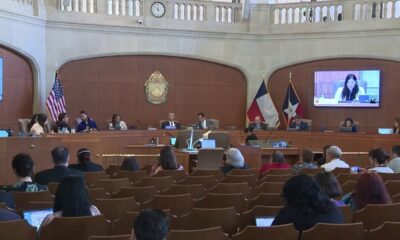News from the South - Alabama News Feed
New Florida law allowing C-sections outside hospitals could be national model • Alabama Reflector
New Florida law allowing C-sections outside hospitals could be national model
by Anna Claire Vollers, Alabama Reflector
January 29, 2025
This story originally appeared on Stateline.
A recently enacted Florida law that allows doctors to deliver babies via cesarean section in clinics outside of hospitals could be a blueprint for other states, even as critics point to the role that a private equity-backed physicians group played in its passage.
The United States has poor maternal health outcomes compared with peer nations, and hospital labor and delivery units are shuttering around the country because of financial strain. Supporters say the Florida law could increase access to maternity care and lower costs for expecting patients.
But critics, including some physician, hospital and midwife groups, warn it’s an untested model that could put the health of mothers and babies at risk. They also note that private equity firms that have made other forays into health care have attracted state scrutiny for allegedly valuing profits over patient safety.
GET THE MORNING HEADLINES.
Alex Borsa, a researcher at Columbia University whose published work focuses on private equity’s impact on health care, said he’s not surprised that Florida has become the testing ground for such clinics.
“In addition to Florida being the Wild West in a number of policy directions, it has one of the highest concentrations of private equity-backed health care operators, including OB-GYN and fertility,” Borsa said.
Traditional birth centers are typically staffed by midwives who provide maternity care for low-risk pregnancies and births. Twenty-nine such centers operate in Florida, and about 400 are licensed around the country. The focus in these centers is on natural childbirth in a homelike setting, where women labor without anesthesia and deliver babies vaginally.
Florida’s law creates a new designation, called an “advanced birth center,” that allows physicians to offer labor and delivery services at a freestanding clinic, including delivery by cesarean section. There currently are no such centers. A C-section is a surgical procedure performed with anesthesia in which a baby is delivered through an incision in the patient’s abdomen and uterus. C-sections are generally reserved for situations in which a doctor believes a vaginal birth could be risky for the mother or baby.
We’re primarily opposed to it because you’re calling a lion a tiger.
– Kate Bauer, executive director of the American Association of Birth Centers
Prior to the law’s passage last spring, C-sections could only be performed in hospitals, which have the staffing and equipment designed for surgery and potential complications.
But a private equity-owned physician group called Women’s Care Enterprises in recent years lobbied Florida legislators for the new designation. The group, owned by London-based investment firm BC Partners, operates about 100 clinics across Florida and a dozen more in Arizona, California and Kentucky.
The new designation was tucked inside a larger health policy bill and became law despite opposition from medical and midwifery groups.
“Both mom and baby deserve access to the best possible care, which is why we believe that C-sections should be performed exclusively in the hospital setting where doctors, multidisciplinary teams, sophisticated equipment, and other critical resources are immediately available in the event complications arise,” Florida Hospital Association President and CEO Mary Mayhew told Stateline in a statement.
But the association didn’t fight the bill, which among other things increased Medicaid payments to hospitals for maternity care. Other groups did oppose it.
“We’re primarily opposed to it because you’re calling a lion a tiger,” said Kate Bauer, executive director of the American Association of Birth Centers, a nonprofit that sets national standards for birth centers.
She noted that while advanced birth centers would offer maternity care outside a hospital setting, they are not the same as traditional midwifery-based birth centers. Midwife-attended births are for people with low-risk pregnancies and tend to focus on low-intervention care and emphasize natural birthing techniques. Physician-attended births tend to rely on more advanced medical interventions, like epidurals and labor-inducing medication.
Private equity jumps in
Florida lawmakers supporting the new advanced birth center designation have said it has the potential to increase access to maternity care in underserved areas and reduce costs. Just two of Florida’s 22 rural hospitals have labor and delivery services.
The staff of Florida state Sen. Gayle Harrell, the Republican who sponsored the bill, told Stateline she was unavailable to comment on it. But in previous committee hearings, Republican legislators heralded the centers as an innovative solution for obstetrical care.
“I think what we are hearing from our medical community is the desire for options,” state Sen. Colleen Burton, a Republican, said at a December 2023 committee hearing on the bill. “And what we’re particularly hearing from are patients, from Floridians, [who want] options. And potentially this could provide a lower-cost option.”
But critics question whether OB-GYNs, already in short supply in Florida, are likely to open advanced birth centers in low-income and rural communities where a larger share of patients have Medicaid. The government-sponsored insurance reimburses doctors significantly less for maternity care compared with private insurance.
Borsa, of Columbia University, co-authored a 2020 study that found private equity-owned OB-GYN offices were more likely to be located in urban areas with median household incomes above the national average.
Private equity firms use pooled money from investors to buy controlling stakes in companies. They typically focus on boosting the value of a company before selling it within a few years, ideally at a profit. In the past decade, private equity investors have spent $1 trillion acquiring health care companies.
Borsa said he and his colleagues have found strong evidence that private equity involvement in health care “pretty consistently increases costs to patients and payers.”
“There’s a fantasy that Wall Street investors are somehow going to increase access in some of the most rural and poor parts of the country, but we haven’t seen evidence of that,” he said.
In recent years, private equity’s involvement in the health care industry has drawn public ire and legislative scrutiny. Earlier this month, for example, the U.S. Senate Budget Committee released a report detailing how private equity firms wrung hundreds of millions from struggling hospitals.
Dr. Helen Kuroki, the chief medical officer for Women’s Care Enterprises, declined to comment on its support of the new law and on when it might open an advanced birth center. Representatives have previously said they’re looking at opening a center in Tampa or Orlando.
Labor and delivery services tend to be financial losers for hospitals, thanks to low reimbursement rates, particularly from Medicaid. In rural areas, where Medicaid covers as many as half of all births, reimbursement doesn’t cover the full cost of providing obstetrical services.
If patients covered by better-paying private insurance flock to freestanding birth centers that can perform C-sections, that would leave hospitals with a higher proportion of Medicaid patients. And owning the surgical space would allow physicians groups such as Women’s Care Enterprises to keep more of the reimbursement dollars that would normally go to a hospital.
Like surgical centers — sort of
Supporters have compared Florida’s new birth center model to outpatient surgery centers, where patients undergo surgical procedures that don’t require overnight hospital stays. Patients who undergo C-sections would be able to stay overnight at the new birth centers.
But critics argue a C-section is inherently different from, say, cataract surgery or a tonsillectomy.
“We’ve seen outpatient surgery centers can be a successful health care delivery model,” said Bauer, of the birth centers association. “For me, the primary difference is that surgical birth is the only surgery where, when you’re done, you have an extra person. And it’s an extra person whose health may be compromised.”
Some Florida lawmakers expressed concern that the new centers wouldn’t be required to have pediatric specialists on hand to care for a baby if there’s a problem after the birth. The centers are required to have a written agreement with a local hospital for transferring patients with complications. And they also must follow most safety standards for outpatient surgical centers.
So far, Florida remains an outlier. Legislators in other states have yet to introduce similar bills.
But as private equity firms deepen their involvement in women’s health and other health care sectors, Borsa expects them to ratchet up their lobbying of state legislators to win favorable policy changes.
“We could see more health care lobbying, and specifically around this issue in other parts of the country,” he said. “I don’t think this is a one-off, especially if they find they can derive profits.”
Stateline is part of States Newsroom, a nonprofit news network supported by grants and a coalition of donors as a 501c(3) public charity. Stateline maintains editorial independence. Contact Editor Scott S. Greenberger for questions: info@stateline.org.
YOU MAKE OUR WORK POSSIBLE.
Alabama Reflector is part of States Newsroom, a nonprofit news network supported by grants and a coalition of donors as a 501c(3) public charity. Alabama Reflector maintains editorial independence. Contact Editor Brian Lyman for questions: info@alabamareflector.com.
The post New Florida law allowing C-sections outside hospitals could be national model • Alabama Reflector appeared first on alabamareflector.com
News from the South - Alabama News Feed
Alabama immigration enforcement bill gets approval from 2nd House committee
by Ralph Chapoco, Alabama Reflector
April 3, 2025
An Alabama House committee Wednesday approved an immigration bill that had already received another committee’s approval earlier in the session.
The House Judiciary Committee approved HB 7, sponsored by Rep. Ernie Yarbrough, R-Trinity, which would give local law enforcement the authority to enforce the country’s immigration laws.
“There are no new laws added,” Yarbrough said to committee members during the meeting. “It simply allows that partnership to take place just to address safety in our communities.”
GET THE MORNING HEADLINES.
Judiciary approved the bill about six weeks after the House Public Safety and Homeland Security did so in February. It is unusual for a bill to go through two committees before going to the floor of the House for a vote. The last major legislation to get routed through two House committees was the bill legalizing medical cannabis in Alabama in 2021.
The current bill, largely unchanged from last year, allows local law enforcement, such as sheriff’s offices and police departments, to enter into agreements with federal agencies to arrest and detain people who are not legally authorized to reside in the country.
Once in custody, deputies and police officers must then attempt to determine a person’s immigration status and get the help of an interpreter to determine someone’s nationality.
If a person cannot provide documentation proving they are eligible to live in the country, local law enforcement may then reach out to a Law Enforcement Support Center (LESC) to get information about a person’s immigration status.
The bill states that people cannot be detained solely because of their immigration status unless authorized by Immigration and Customs Enforcement, and that sheriffs’ deputies and police departments will verify that a person has an arrest warrant within 24 hours of the person getting detained.
Law enforcement must also obtain documents to verify a person’s immigration status, bet that a passport or a permanent resident card.
House Judiciary Committee members approved an amendment making a few of the requirements optional. A previous version required the Alabama Attorney General’s Office to publicly name any agency failing to comply with provisions in the legislation and notify the governor’s office.
The updated language gives the AG’s Office an option to inform the Governor’s Office.
Another amendment also allows, but doesn’t require, local law enforcement to report the total number of people arrested and the number of foreign nationals they take into custody as well as the inquiries they make to the LESC.
Immigration advocates who spoke at a public hearing on the legislation in March said the legislation is creating fear among immigrant communities. That, they said, would lead to mistrust toward law enforcement and increased school truancy for children of immigrants who are afraid to attend school for fear of their parents being deported.
Democrats on the House Judiciary Committee criticized the legislation.
“What country do we border in Alabama?” asked Rep. Penni McClammy, D-Montgomery during the committee meeting Wednesday.
Yarbrough said that every state is connected, and that people travel.
“Each state doesn’t have a physical wall, so people travel from state to state,” Yarbrough said.
YOU MAKE OUR WORK POSSIBLE.
Alabama Reflector is part of States Newsroom, a nonprofit news network supported by grants and a coalition of donors as a 501c(3) public charity. Alabama Reflector maintains editorial independence. Contact Editor Brian Lyman for questions: info@alabamareflector.com.
The post Alabama immigration enforcement bill gets approval from 2nd House committee appeared first on alabamareflector.com
News from the South - Alabama News Feed
New Tariffs Could Raise Car Prices | April 2, 2025 | News 19 at 10 p.m.
SUMMARY: A 25% tariff on foreign cars and auto parts is set to take effect at midnight, potentially raising prices for consumers. While current inventory and cars already at U.S. ports will remain at existing prices, future pricing remains uncertain. Dealerships in North Alabama say it’s too early to know the full impact, but warn that repair costs may also rise due to higher parts prices. Some manufacturers may absorb part of the tariff, while others could pass the full cost to buyers—raising a $30,000 car to nearly $40,000. Dealerships report a recent surge in buyers trying to purchase before prices rise.

A 25% tariff on any foreign cars or auto parts will go into effect in a couple of hours.
News 19 is North Alabama’s News Leader! We are the CBS affiliate in North Alabama and the Tennessee Valley since November 28, 1963.
https://whnt.com/
https://www.facebook.com/whntnews19
https://www.instagram.com/whntnews19/
https://twitter.com/whnt
News from the South - Alabama News Feed
Weather Fun 1on1: Brylee explains why thunderstorms occur more often in the summer than in the wi…
SUMMARY: Meteorologist Brylee Brown explains why thunderstorms are more common in summer than winter in her “Weather Fun 1-on-1” segment. Joined by Aidan, they conduct an experiment using two bowls of air at different temperatures. The warm air inflates a balloon, demonstrating that warm air is less dense and rises, while cold air causes the balloon to deflate. This principle helps explain why summer afternoons often bring air mass thunderstorms, as humid, warm air is abundant. In winter, less warm air means these storms are rare. For more weather science resources, viewers can scan a QR code or visit the website.

Weather Fun 1on1: Brylee explains why thunderstorms occur more often in the summer than in the winter
Subscribe to WVTM on YouTube now for more: https://bit.ly/2jvAaUD
Get more Birmingham news: http://www.wvtm13.com
Like us: https://www.facebook.com/WVTM13/
Follow us: https://twitter.com/WVTM13
Instagram: https://www.instagram.com/wvtm13/
-

 Mississippi Today1 day ago
Mississippi Today1 day agoPharmacy benefit manager reform likely dead
-

 News from the South - Alabama News Feed7 days ago
News from the South - Alabama News Feed7 days agoSevere storms will impact Alabama this weekend. Damaging winds, hail, and a tornado threat are al…
-

 News from the South - Alabama News Feed6 days ago
News from the South - Alabama News Feed6 days agoUniversity of Alabama student detained by ICE moved to Louisiana
-

 News from the South - Oklahoma News Feed5 days ago
News from the South - Oklahoma News Feed5 days agoTornado watch, severe thunderstorm warnings issued for Oklahoma
-

 News from the South - Virginia News Feed6 days ago
News from the South - Virginia News Feed6 days agoYoungkin removes Ellis, appoints Cuccinelli to UVa board | Virginia
-

 News from the South - Kentucky News Feed7 days ago
News from the South - Kentucky News Feed7 days agoA little early morning putting at the PGA Tour Superstore
-

 News from the South - Georgia News Feed5 days ago
News from the South - Georgia News Feed5 days agoGeorgia road project forcing homeowners out | FOX 5 News
-

 News from the South - North Carolina News Feed7 days ago
News from the South - North Carolina News Feed7 days agoArtificial intelligence experiment begins in North Carolina treasurer’s office | North Carolina








































